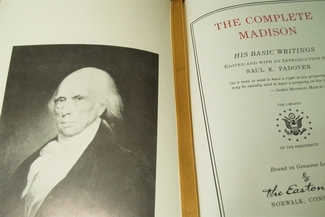What are The Federalist Papers?
The Federalist Papers are a collection of 85 essays written by Alexander Hamilton, James Madison, and John Jay. Originally published anonymously under the pseudonym "Publius" between 1787 and 1788, these essays were written to promote the ratification of the United States Constitution. The essays were published in various newspapers throughout the thirteen states and were intended to explain and defend the principles and structure of the proposed Constitution. They addressed a wide range of topics related to government and politics, including the separation of powers, the role of the judiciary, federalism, and the need for a strong national government.The Federalist Papers remain one of the most influential works of political theory in American history. They provide valuable insights into the framers' intentions and have been cited extensively in debates over constitutional interpretation and the nature of American democracy.
Who wrote The Federalist Papers?
The Federalist Papers were primarily written by Alexander Hamilton, James Madison, and John Jay. These essays were published anonymously under the pseudonym "Publius" between 1787 and 1788 in various newspapers to promote the ratification of the United States Constitution. While Hamilton, Madison, and Jay were the main authors, there are 85 essays in total, with Hamilton writing the majority (approximately 51 essays), followed by Madison (approximately 29 essays), and Jay (approximately 5 essays).Who authored part of The Federalist Papers & drafted the Bill of Rights?
Part of The Federalist Papers were authored by future President James Madison, who also played a crucial role in drafting the Bill of Rights. Madison is often referred to as the "Father of the Constitution" due to his significant contributions to its drafting during the Constitutional Convention of 1787. Following the convention, Madison was instrumental in advocating for the ratification of the Constitution, co-authoring many of the essays in The Federalist Papers alongside Alexander Hamilton and John Jay. Later, as a member of the House of Representatives, Madison drafted the amendments that would become the Bill of Rights, which were added to the Constitution in 1791.What was the purpose of The Federalist Papers?
The purpose was to promote the ratification of the United States Constitution. These essays were written primarily by Alexander Hamilton, James Madison, and John Jay under the pseudonym "Publius" and were published in various newspapers between 1787 and 1788. The authors sought to provide a persuasive argument in favor of the Constitution by explaining its principles, structure, and benefits. They addressed concerns and criticisms that were raised by opponents of the Constitution, such as fears about the concentration of power in the federal government and the potential erosion of states' rights. Ultimately, the goal of The Federalist Papers was to win over public opinion and secure the necessary support for ratification in the thirteen states.Why were The Federalist Papers written?
They were written to promote the ratification of the United States Constitution. After the Constitutional Convention of 1787, during which the Constitution was drafted, a vigorous debate arose between Federalists, who supported the Constitution, and Anti-Federalists, who opposed it. The Federalists believed that a stronger central government was necessary for the stability and prosperity of the new nation, while the Anti-Federalists were concerned about the potential for tyranny and the lack of protections for individual rights.In response to these debates, Alexander Hamilton, James Madison, and John Jay collaborated to write a series of essays under the pseudonym "Publius." These essays were published in newspapers throughout the thirteen states and were intended to explain and defend the principles and structure of the proposed Constitution. They addressed various concerns raised by Anti-Federalists and sought to reassure the public about the benefits of ratifying the Constitution.
Ultimately, The Federalist Papers served as a persuasive tool to garner support for the Constitution and to counteract the arguments of its opponents. They provided a comprehensive analysis of the proposed system of government, including its separation of powers, checks and balances, and federalist structure. By presenting a coherent and compelling argument in favor of ratification, the Federalist Papers played a crucial role in shaping public opinion and securing the necessary support for the adoption of the Constitution.
When were The Federalist Papers written?
They were written between October 1787 and August 1788. They were penned during a critical period in American history following the Constitutional Convention of 1787, where the United States Constitution was drafted. The essays were published in various newspapers in New York and other states during this time frame.What is argued by James Madison in The Federalist Paper number 10?
In Federalist Paper No. 10, Future President James Madison argues against the dangers of factionalism and the potential for tyranny of the majority in a democratic society. He advocates for a large republic as a solution to mitigate the effects of factions. Madison defines factions as groups of citizens with common interests or passions, which he considers inevitable in a free society. He contends that factions can lead to instability, injustice, and oppression of minority interests.
Madison suggests that in a large republic, the sheer size and diversity of interests would make it difficult for any single faction to dominate the political landscape. He argues that in such a system, representatives elected by the people would be more likely to act in the public interest rather than catering solely to the demands of narrow factions. By dispersing power among various factions and interests, Madison believed that the potential for tyranny would be minimized and the principles of republican government upheld. So, James Madison argues for the necessity of a large republic to control the effects of factions in Federalist Paper No. 10.
Why were The Federalist Papers important?
The Federalist Papers stand as a cornerstone in the history of American political thought, a testament to the intellectual vigor and constitutional debates that shaped the nascent United States. Penned primarily by Alexander Hamilton, James Madison, and John Jay, these essays emerged during a pivotal period in American history, following the drafting of the United States Constitution in 1787. Their significance lies in several key aspects:Firstly, the Federalist Papers were crucial in securing the ratification of the Constitution. At the time of their publication, the United States was a young nation grappling with the complexities of governance. The Constitution proposed a radical departure from the Articles of Confederation, which had proven inadequate in providing a stable and effective federal government. The essays served as a persuasive tool, articulating the rationale behind the proposed Constitution and addressing the concerns of its critics. By elucidating the principles of republican government, the separation of powers, and the necessity of a strong union, the Federalist Papers played a pivotal role in swaying public opinion and garnering support for ratification.
Secondly, the Federalist Papers provided profound insights into the framers' intentions and the principles underlying the Constitution. Through their rigorous analysis of political theory and practical governance, Hamilton, Madison, and Jay elucidated the complexities of the constitutional framework, shedding light on its intricacies and implications. The essays delved into topics such as the separation of powers, federalism, and the balance between liberty and authority, offering a comprehensive blueprint for the new government.
Furthermore, the Federalist Papers remain highly relevant in contemporary political discourse. Their discussions on topics such as the dangers of factionalism, the role of the judiciary, and the limits of executive power continue to resonate in debates over constitutional interpretation and the proper functioning of government. The Federalist Papers serve as a timeless resource for scholars, policymakers, and citizens alike, providing valuable insights into the enduring principles of American democracy.
In summary, the Federalist Papers were important not only for their immediate impact on the ratification of the Constitution but also for their enduring legacy in shaping American political thought. They continue to serve as a beacon of intellectual rigor and constitutional wisdom, reminding us of the principles and values upon which the nation was founded.
Who were the Federalists and Anti-Federalists?
During the ratification debates of the United States Constitution in the late 1780s, two main groups emerged: the Federalists and the Anti-Federalists. The following is an overview of each.Federalists
The Federalists were proponents of the Constitution and supported its ratification. They believed that a stronger central government was necessary to address the weaknesses of the Articles of Confederation and to promote national unity, stability, and prosperity.Federalist leaders included Alexander Hamilton, Future President James Madison, John Jay, and John Adams. They argued for the adoption of the Constitution, emphasizing its benefits such as creating a more effective system of government, establishing a stable economic framework, and ensuring the protection of individual liberties through checks and balances.
Federalists published a series of essays known as "The Federalist Papers" to articulate and defend their views on the Constitution.
Anti-Federalists
The Anti-Federalists were opponents of the Constitution and raised concerns about its potential to centralize power and infringe upon individual rights. They preferred a more decentralized system of government with stronger state sovereignty.Anti-Federalist leaders included Patrick Henry, George Mason, and Thomas Jefferson. They criticized the Constitution for lacking a bill of rights to protect individual liberties and feared that a strong central government could become tyrannical.
Anti-Federalists published essays, pamphlets, and speeches to argue against the Constitution's ratification, expressing concerns about the potential for abuse of power and the erosion of states' rights.
Ultimately, despite their differences, both Federalists and Anti-Federalists contributed to a robust debate over the nature of American government and the rights of citizens. The compromises reached between these two groups, including the addition of a Bill of Rights to the Constitution, helped pave the way for its eventual ratification and the establishment of the American republic.
How to cite The Federalist Papers
Citing The Federalist Papers typically follows a specific format, whether you're using the Modern Language Association (MLA), American Psychological Association (APA), or Chicago Manual of Style citation styles. Here's how you can cite in each of these styles:MLA Style
Author's Last Name, First Name. "Title of the Essay." Title of the Book, edited by Editor's First Name Last Name, Publisher, Year, Page Range.For example:
Hamilton, Alexander, et al. "Federalist No. 10." The Federalist Papers, edited by Clinton Rossiter, Penguin Books, 1961, pp. 57-69.
APA Style
Author's Last Name, First Initial. (Year of Publication). Title of the Essay. In Editor's First Initial. Last Name (Ed.), Title of the Book (pp. Page Range). Publisher.For example:
Hamilton, A. (1787). Federalist No. 10. In C. Rossiter (Ed.), The Federalist Papers (pp. 57-69). Penguin Books.
Chicago Manual of Style (Notes and Bibliography)
Author's First Name Last Name, "Title of the Essay," in Title of the Book, ed. Editor's First Name Last Name (Place of Publication: Publisher, Year), Page Range.For example:
Alexander Hamilton, "Federalist No. 10," in The Federalist Papers, ed. Clinton Rossiter (New York: Penguin Books, 1961), 57-69.
When citing a specific Federalist Paper, make sure to include its number (e.g., Federalist No. 10 for James Madison's essay on factions) and the name of the editor (if applicable) for the edition you're using.



Comments
Post a Comment
Share your best book review and recommendation